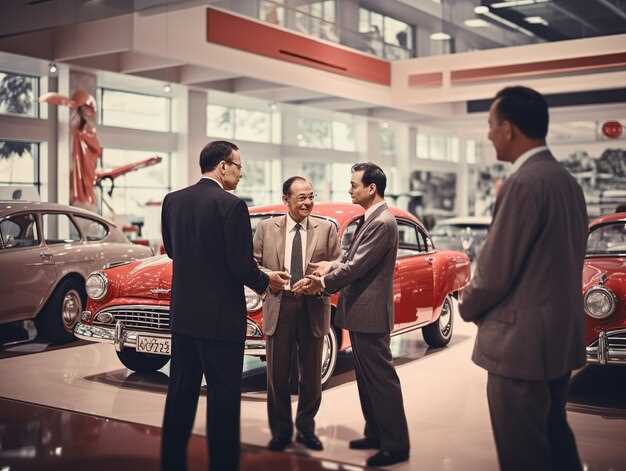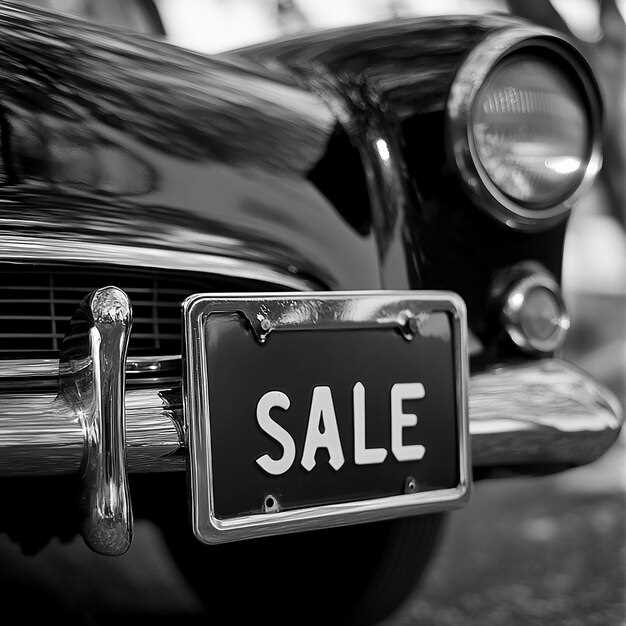
When it comes to acquiring a classic car, the decision between purchasing from a dealer or through a private sale can significantly influence your experience and satisfaction. Each option presents unique advantages and drawbacks, which can affect both the cost and quality of the car you ultimately choose. Understanding the comparison between these two sales channels is essential for making an informed decision.
Buying from a dealer often provides a sense of reliability, as these establishments typically offer warranties and a selection of well-maintained classic cars. However, this convenience can come at a premium price. In contrast, private sales often cater to enthusiasts who are eager to sell their cherished vehicles, potentially leading to better deals. Yet, this approach carries inherent risks, such as a lack of formal documentation and limited recourse in case of hidden issues.
As you navigate the classic car market, weighing the pros and cons of each method will help you determine which buying route aligns best with your personal preferences and budget. In this article, we will delve deeper into the nuances of dealer versus private sales, equipping you with the knowledge needed to make the right choice for your next classic car investment.
Dealer or Private Sale: Which is Best for Classic Cars?
When considering the sale of a classic car, the choice between dealing with a professional dealer or opting for a private sale is pivotal. Each option presents distinct advantages and challenges that can significantly influence the sale process and overall satisfaction.
A dealer typically offers a more streamlined process. They handle all aspects of the sale, including marketing, negotiation, and paperwork. This can save a seller significant time and effort, especially for those unfamiliar with the intricacies of classic car transactions. Furthermore, dealers often have access to a wider network of potential buyers, which can lead to a quicker sale.
However, working with a dealer usually comes with a cost. Dealers often charge a commission on the sale price, which can reduce the overall profit. Additionally, while dealers may provide expertise and a certain level of assurance in the transaction, their interest may not always align with that of the seller, leading to potential compromises on sale price.
On the other hand, a private sale can result in a more favorable financial outcome for the seller. By bypassing the dealer, sellers can retain the entire sale price, maximizing their profit. Selling privately also allows for more direct interaction with buyers, which can sometimes lead to a stronger connection and better negotiation opportunities.
Nevertheless, private sales come with their challenges. The process can be time-consuming, as sellers must handle advertising, inquiries, and showings themselves. Additionally, assessing the car’s value and negotiating effectively requires knowledge and confidence that some sellers may lack.
In conclusion, the decision between a dealer or private sale for classic cars depends on individual priorities. Sellers seeking convenience and efficiency may lean towards a dealer, while those focused on maximizing their sale profit may find a private sale more appealing. A thorough comparison of both options will help sellers make informed choices that align with their goals.
Evaluating the Financial Aspects of Dealer vs. Private Sales

The choice between purchasing a classic car from a dealer or a private seller involves various financial considerations. Understanding these aspects can help buyers make informed decisions that best suit their financial situations.
Cost Comparison
When comparing costs, it’s essential to evaluate the following:
- Dealer Prices: Dealers often charge a premium for classic cars due to their overhead costs, which include showroom expenses and staff salaries.
- Private Seller Prices: Private sales typically offer lower prices, as sellers often wish to sell quickly and may not have the overhead of a dealership.
Negotiation Potential
Negotiation dynamics differ between the two options:
- Dealers: While negotiations are possible, dealers may have fixed pricing structures and may not be willing to budge as much on price due to set profit margins.
- Private Sellers: They often have more flexibility in pricing and may be more inclined to negotiate, especially if they are motivated to sell quickly.
Additional Costs
Buyers should also consider additional expenses associated with both purchasing methods:
- Dealer Fees: Dealerships may apply additional fees, such as service charges, which can increase the overall cost.
- Inspection Fees: Buyers may need to pay for inspections or certifications, which may be included at a dealership but will typically be additional for private sales.
- Financing Options: Dealers often provide financing options that may suit buyers looking to spread the cost over time, while private sales usually require full payment upfront.
Resale Value Considerations
The potential resale value of a classic car can also vary significantly between the two sales channels:
- Dealers: A car purchased from a dealer might retain its value better due to brand reputation and warranty options.
- Private Sales: Cars bought from private sellers may have a lower initial price, but ensuring the car’s condition and provenance is key to maintaining its value.
In summary, evaluating the financial aspects of dealer versus private sales reveals distinct advantages and disadvantages depending on the buyer’s priorities, budget, and willingness to negotiate. Careful consideration of these factors can ultimately guide buyers toward the most financially sound decision for their classic car purchases.
Understanding the Market Reach: Dealer Inventory vs. Private Listings

When considering the sale of classic cars, it is vital to understand how dealer inventories and private listings differ in market reach. Dealers often have established networks, allowing them to attract a larger pool of potential buyers. Their showrooms and online presence can provide significant visibility, which is crucial for classic car enthusiasts seeking rare models.
Dealers frequently invest in marketing, leveraging social media and specialized car platforms to reach a broader audience. This approach can expedite the sale process, as dealers may have access to clients specifically looking for classic vehicles. Additionally, they often have the resources to showcase cars through high-quality photography and detailed descriptions, making the listings more appealing.
On the other hand, private listings tend to reach a more niche audience. Sellers may have direct connections within classic car communities, allowing them to connect with prospective buyers who are equally passionate about specific models or makes. While private sales might not have the same visibility as dealer inventories, they can foster a sense of trust and authenticity among buyers, as the transaction typically involves direct communication between seller and buyer.
Ultimately, the choice between dealer inventory and private listings will depend on the seller’s goals. If the priority is a fast sale with wider exposure, a dealer may be the better option. However, for those who value direct engagement and potentially a more personal selling experience, private listings can offer unique advantages in the classic car market.
Assessing the Overall Experience: Buyer Support and Trust Factors
When considering the sale of classic cars, the overall experience largely depends on the type of seller–dealer or private individual. Each option presents unique buyer support and trust factors that can significantly influence decision-making.
Dealers typically offer a more structured process, providing buyers with a range of support services. This includes assistance with financing, warranties, and after-sales care. A reputable dealer often has established relationships within the classic car community, ensuring that the vehicles they sell are verified for authenticity and quality. This can enhance buyer confidence, as dealers usually have a vested interest in maintaining their reputation.
In contrast, private sales can be appealing due to potentially lower prices and more personal interactions. Buyers may find emotional value in direct negotiations with a car’s previous owner. However, trust becomes a critical factor, as it heavily relies on the seller’s honesty regarding the condition and history of the classic car. Unlike dealers, private sellers may lack the resources to provide thorough documentation or guarantees, which can lead to uncertainty.
To further evaluate trust factors, buyers should consider the availability of service history, inspection records, and any previous valuations. Engaging a trusted mechanic to inspect the classic car can also provide peace of mind. Additionally, platforms or marketplaces specializing in classic vehicles may add layers of protection, offering buyer feedback systems and dispute resolution services that enhance the overall experience.
Ultimately, assessing buyer support and trust factors requires careful consideration of both the dealer and private sale options. While dealers may offer more in terms of post-sale assurance, private sellers can provide a unique purchasing experience that resonates with classic car enthusiasts.


